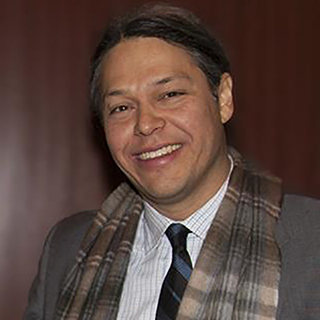
Gilder Lehrman Institute of American History
Ned Blackhawk (Western Shoshone) is a Professor of History and American Studies at Yale. He serves as the faculty coordinator for the Yale Group for the Study of Native America, the Yale Indigenous Performing Arts Program, the Native American Language Project and the Henry Roe Cloud Dissertation Writing Fellowship. He has authored and co-edited books and volumes in Native American history, including “Violence over the Land: Indians and Empires in the Early American West” (Harvard University Press, 2006) and “Indigenous Visions: Rediscovering the Legacy of Franz Boas” (Yale University Press, 2018), which both won professional association prizes. His current project is “The Rediscovery of America: American Indians and the Unmaking of U.S. History” (Yale University Press, forthcoming 2022).
Yale seniors Meghanlata Gupta (Ojibwe) and Madeleine Freeman (Choctaw/Chickasaw) sat down with Professor Blackhawk to discuss Native studies at Yale, his own academic projects and what changes he hopes to see at Yale in the future.
This Q&A has been edited for clarity and brevity.
Q: When did you start teaching at Yale?
A: I was invited to interview at Yale in 2007 and was presented with a tenured offer in June 2008. I started teaching here in the falI of 2009.
Q: What advice would you give to your past college self?
A: I think there’s a lot of benefit to learning how to balance personal and professional life.
Q: What is the importance of Native studies at Yale?
A: As an institution, Yale possesses great potential to work in deeper collaboration and engagement with Native America. I believe that we have developed many incredible opportunities and established a sense of potential that can be further realized. The Native community on campus has grown dramatically in the past generation, and I think that Native studies at Yale is best illuminated by the number of students who have joined the varied programs, courses, and activities that we run and become a part of this community. It’s not necessarily something you can point to in a curriculum guide — but there is an incredibly active, engaged and accomplished Native American student and alumni community that I am proud of. Native studies at Yale is not only an academic form of pedagogy but also a practice that has grown over the past twenty years into a vibrant social community.
Q: What have been some of your favorite Native American Cultural Center activities?
A: For me, the NACC has become the central nervous system for larger Native studies initiatives on campus. Its opening in 2013 was the realization of at least two decades of student and community organization. This achievement has become more and more evident with each year, as the NACC has hosted film and theater festivals; annual recruitment dinners; countless meetings, language lessons, drum practices, and so much more. We once did “twenty Native films in six days,” and invited Native actors and film-makers from Canada to California. The current YUAG show “Place, Nations, Generations, Beings” exhibit is extraordinary and the result of years of dedication. The Yale Indigenous Performing Arts Program is now in its sixth year. Its annual Native Youth Storytelling Festival is not to be missed. I’m particularly fond of the experiential learning trips that we’ve taken which have become real community collaborations on campus. I also enjoy teaching my seminars in the Seminar Room. It’s all been pretty exciting. Collectively, these events and activities have helped to build an awareness of Native American issues on campus and to institutionalize commitments in the arts, theater, and legal studies, among other areas. I believe they have also helped to empower our students.
Q: What are your current projects?
A: I’ve been working on a few things lately: I’m co-editing a book on Indigenous genocide and settler-colonialism and continuing to work on the Henry Roe Cloud Series with Yale U.P. I’m also close to completing “The Rediscovery of America: American Indians and the Unmaking of US History” which tries to show how recent studies of Native American history have fundamentally recast the study of US history. Over a generation of American Indian historians have produced a flourishing literature of works that I believe have collectively unmade conventional paradigms of US historical analysis. This book tries to show this process and suggests that we can’t really understand US history without a sustained and enduring engagement with Native American history. From the transformation of Native American lands into private property regimes in the early Republic through the Reconstruction Era and the growth of congressional authority across the west, we can’t understand the origins and expansion of the United States without understanding the continental conquest of Native America.
Q: What do you teach at Yale?
A: Primarily, I teach Introduction to American Indian History, Writing Tribal Histories, Indians and the Spanish Borderlands, and American Indian Law and Policy. My primary graduate course is Indians and Empires.
Q: What are some changes that you would like to see take place at Yale for Native students?
A: I think we could be doing more. A good start would be to hire more Native American senior faculty members and begin to institutionalize further some of these ongoing efforts while expanding our course offerings and advising. I also think we could use more university resources to partner with contemporary tribal communities. Like most institutions, Yale really can be doing much more to confront, study and engage asymmetries in health and educational equity; social and technological disparities; and other types of recurring concerns across Native North America.
Q: Do you have any secret talents or hobbies?
A: I made a set of bookshelves this summer that I’m proud of and enjoy running at East Rock, which has been closed to traffic for much of 2020 due to the pandemic.
Meghanlata Gupta | meghanlata.gupta@yale.edu
Madeleine Freeman | madeleine.freeman@yale.edu







